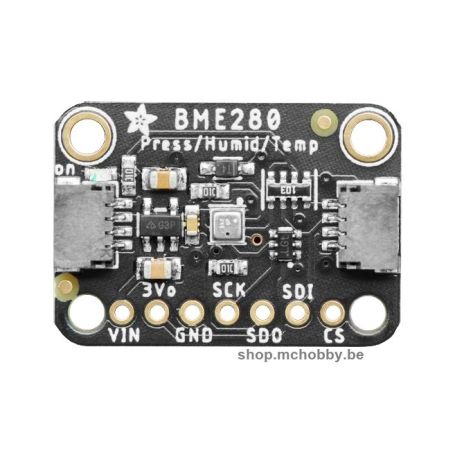BME280 - Temp/Humidity/Pressure sensor - I2C, SPI - StemmaQT/Qwiic -
- Temperature - ±1°C accuracy
- Atmospheric pressure - ±1 hPa absolute accuracy
- Relative humidity - ±1% accuracy
- Bus: I2C or SPI
- 5V or 3.3v compatible
- StemmaQT/Qwiic connector
Payments are secured by LyraCollect, a French payment collection company.
It is possible to delivered to your home, to a pick-up point or picked up by appointment at MCHobby
We prepare, pack and ship your orders with great respect and care.
Athmospheric pressure, temperature and humidity sensor
Bosch has intensified its work on its sensors to offer us the BME280, an environmental sensor for measuring temperature, barometric pressure and humidity! This sensor will be ideal for making small weather stations or sensitive to the environment. The best for last, it can be used in I2C and SPI!
This Bosch precision sensor is the best "low-cost" sensor solution that measure moisture with ±3% accuracy, barometric pressure with absolute accuracy of ±1hPa, and temperature accuracy of ±1.0°C. Since the pressure changes with altitude, and the pressure measurement is so good, that you can also use this sensor as an altimeter with an accuracy of ±1 meter (or better)!
The BME280 is part of the next generation of Bosch sensors and represents the evolution of the BMP085/BMP180/BMP183 - with a reduced noise on the altimeter (0.25m) with a conversion time always fast.
It has the same specifications, but can use either I2C or SPI.
If you want a "simple connection" option, opt for I2C. If you need to connect many sensors without worrying about I2C address collisions then opt for the SPI connection.
A nice sensor, isn't it? Adafruit has made the necessary to weld the BME280 on a breakout board to facilitate its integration into your projects. The sensor is accompanied by a 3.3V voltage regulator and a level shifter (Logic level converter)... It's great because, suddenly, you can use this sensor with Logic 3V or 5V without any worry.
Technical details
- Dimension: 25.5mm x 18.0mm x 5.1mm
- Weight: 1.5gr
- Qwiic/StemmaQt connector
- Breakout connector
- BME280 data sheet
Tutorials
- BME280 Humidity+Barometric Pressure+Temperature sensor (Adafruit, English)
Make your next environmental and weather sensor system.








